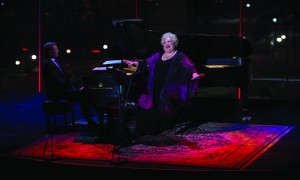Elegant Nostalgia from a True Diva
The obituary for the solo vocal recital has been written so frequently it is a wonder that singers still attempt to present it. Yet in two recitals this fall, San Diego Opera has clearly demonstrated how to make this supposedly moribund format come to life.
In September, the young husband and wife opera duo of Ailyn Pérez and Stephen Costello assembled a fresh program of unusual but attractive arias and songs, presenting them with verve and conviction. Friday (December 11) at the Balboa Theatre, mezzo-soprano Stephanie Blythe and pianist Craig Terry mounted a vocal tribute to the late American singer Kate Smith, and their vibrant renditions of classic popular songs and ballads of the last century completely captivated their full house in equal—if not greater—measure.
Crowned “First Lady of Radio” in the 1940s, Kate Smith (1907 – 1986) touted a combination of optimism and patriotism in her ardent songs and uplifting patter that resonated with Americans through the Great Depresson and World War II. Through her myriad recordings and radio programs, her rich contralto voice defined songs such as “God Bless America,” “The White Cliffs of Dover,” and her theme song “When the Moon Comes Over the Mountain.”
There is not a scintilla of doubt that Blythe owns this repretory, just as surely as she owned the role of Ulrica in San Diego Opera’s last season production of Verdi’s A Masked Ball and the mezzo solo in the company’s subsequent Verdi Requiem concert. What was thrilling at the Balboa recital, however, was to hear popular songs sung powerfully, with great conviction, and without amplification.
Broadway musicals and American popular song have been debased by cute pixies with puny voices whose only hope for a genuine crescendo at the climax of a song is an alert sound technician at the soundboard turning up the volume controls. And audiences actually imagine something worthy is happening as these wispy voices are ramped up to the edge of distortion.
But to hear Blythe build to a richly-hued vocal fortissimo at the conclusion of “The White Cliffs of Dover” or “Look for the Silver Lining” brought incomparable satisfaction, especially when her penultimate stanza was sung with hovering pianissimo tones that drew her audience in with rapt attention. She obviously enjoyed and clearly communicated the sophisticated dance rhythms of “The Continental” from the 1934 movie musical The Gay Divorcée, and she suggested the mildly exotic overtones of “Bei Mir Bist Du Schoen,” a song from America’s vibrant Yiddish theater scene of the early 1930s that nearly every performing artist form the last century interpreted. In Blythe’s relaxed patter from the Balboa stage, she recounted the saga of this song: the original composers of the Yiddish song sold it for $30, but once Sammy Cahn worked it over and gave it to the Andrews Sisters, it earned millions.
The closest Blythe came to opera Friday night was her middle song in a Kate Smith Medley, the famous Barcarolle from Jacques Offenbach’s The Tales of Hoffmann, which she sang in a clumsy English translation, because, as Blythe cheerfully explained, Smith had a special affection for such mangled borrowings. Blythe gave us a stylish taste of the blues in “Without Love” from the 1930 stage musical Flying High, Kate Smith’s sole foray on the Broadway stage, the year before her own radio show began its decades-long run.
Terry, the epitome of an accomplished and self-effacing accompanist, not only followed Blythe’s every subtle phrasing and interpretive nuance, but occasionally added his own counterpoint at the keyboard, notably a succession of clever dance styles in “The Continental” and a reprise of the Offenbach theme at the conclusion of Eubie Blake’s “Memories of You,” the last song of the Smith Medley. His Chopin snippet—the D-flat Major Prelude—at the opening of one of Blythe’s encores, “I’m Always Chasing Rainbows,” shimmered with relaxed elegance.
With encores, Blythe’s performance lasted 90 minutes (there was no intermission), just the right length for a program of music that does not measure up to the Lieder of Schubert and Brahms or even the contemporary songs of Ned Rorem and Jake Heggie. But it would be a serious loss to forget these once popular songs (the complete program listing can be accessed below) that captured America’s wistful perseverance through the darkest years of the 20th century.
The San Diego Opera season opens on January 24, 2015, with Puccini’s opera La bohème at Civic Theatre. sdopera.com

Ken Herman, a classically trained pianist and organist, has covered music for the San Diego Union, the Los Angeles Times’ San Diego Edition, and for sandiego.com. He has won numerous awards, including first place for Live Performance and Opera Reviews in the 2017, the 2018, and the 2019 Excellence in Journalism Awards competition held by the San Diego Press Club. A Chicago native, he came to San Diego to pursue a graduate degree and stayed.Read more…



